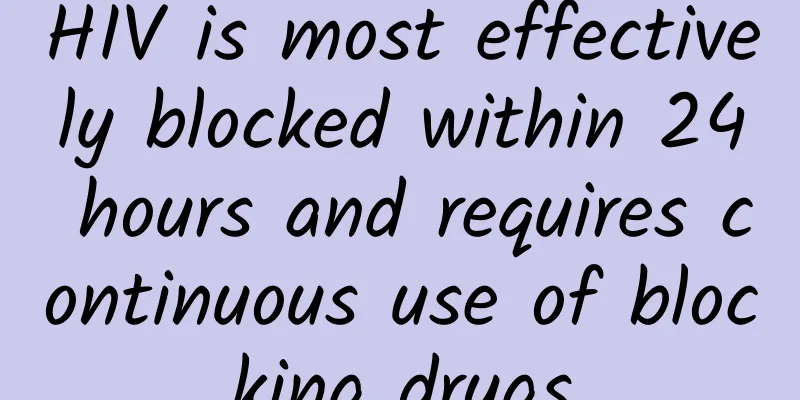HIV is most effectively blocked within 24 hours and requires continuous use of blocking drugs

|
Recently, a post titled "A male student from a Zhejiang university was accused of carrying the HIV virus and enticing others to have unprotected sex" went viral on Weibo. The poster was worried that he might be infected with HIV, so he took blocking drugs for a month to rule out the possibility of infection. For a time, the topic of AIDS once again sparked heated discussions. Is AIDS really a death sentence? How can we prevent AIDS? Click to download this set of pictures On November 30, 2016, college student volunteers from Hebei University of Engineering displayed the red ribbons they made. (Hao Qunying/People's Photo) (Statement: All images with the words "People's Pictures" are copyrighted images and protected by law. Use (including reprinting) requires payment. Please call to purchase: 010-65363647 or 021-63519288.) AIDS ≠ Death Sentence In many people's minds, the word "AIDS" is synonymous with death, and it is even scarier than death, because after being diagnosed with AIDS, it feels like every moment of a patient's life is a countdown to their life, and such days can fill people's lives with fear and despair. But in fact, AIDS is not a death sentence. Generally speaking, from the time of infection with HIV to the onset of AIDS and death, patients usually have a clinical asymptomatic period of about 5-8 years. During this period, patients will not have clinical discomfort, and they can live or work without any symptoms. But it should be noted that the patient's blood, semen, vaginal secretions, breast milk, and organs contain HIV, which is contagious. After entering the onset stage, even common bacterial infections are enough to bring the patient's immune system to the brink of collapse. The HIV virus attacks the human immune system, and untreated AIDS patients eventually die from opportunistic infections or tumors, such as pneumonia. As the body's immunity decreases, patients will be infected with various pathogenic microorganisms more and more frequently, and the degree of infection will become more and more serious, and eventually they will die from various complex infections or tumors. To deal with AIDS, both prevention and treatment are needed The clinical research project "Promotion and Optimization of Standardized Diagnosis and Treatment Programs for AIDS and Tuberculosis" conducted a large-sample tuberculosis epidemiological survey in major AIDS epidemic areas across the country. Preliminary analysis showed that the mortality rate of patients who began anti-HIV treatment 2 weeks after anti-tuberculosis treatment was lower than that of patients who began anti-HIV treatment 8 weeks later. This means that the proportion of immune function reconstruction in the former is higher than that in the latter, and early antiviral treatment is beneficial to the patient's immune function reconstruction. The biggest problem facing the diagnosis and treatment of AIDS in China is that HIV-infected people are not detected early. These "invisible" infected people are often diagnosed when they enter the late stage of AIDS, when the number of important immune cells in their bodies, CD4+T lymphocytes, has dropped to double digits or even single digits per microliter of blood (normal value is 750±250/microliter), and their immune function has almost disappeared, so most of them have serious opportunistic infections and tumors. Early antiviral treatment of AIDS is beneficial to the reconstruction of the patient's immune function. In other words, AIDS is not terrible. As long as it is discovered early, antiviral treatment is started early, and medication is taken on time, the AIDS virus can be controlled and the patient's life expectancy can be close to that of a normal person. After the unfortunate occurrence of high-risk sexual behavior or other body fluid transmission, drug blocking measures can actually be taken within 24 hours of the incident, and the protection rate of 28 consecutive days of preventive medication can reach 100%. AIDS prevention and treatment publicity carried out by schools, communities, and hospitals often focuses on "prevention". In fact, our publicity work should place "treatment" and "prevention" on an equal footing, and vigorously popularize knowledge such as the effects and access channels of AIDS blocking drugs. Author: Lu Hongzhou, AIDS prevention expert of the National Health and Family Planning Commission and professor of Shanghai Public Health Clinical Center Contributed by "Da Yi Xiao Hu" |
>>: When is the best time to eat cranberries? What are the benefits of cranberries?
Recommend
What is the reason for white stuff in the vagina?
For women, they all hope to have a healthy body. ...
How to make hot pot soup base delicious and nutritious? Can peanut sprouts be used in hot pot?
Many people like to drink delicious hot pot soup ...
Can I eat popsicles during my period?
Can you eat popsicles during menstruation? This i...
Can pregnant women use alcohol to wipe their skin?
Alcohol is a very common substance in our daily l...
At what age does a woman enter menopause?
Many people should know that women will be called...
Why do steamed buns collapse? How to make the dough soft and delicious?
During the epidemic, many people were quarantined...
Will there be leucorrhea in early pregnancy?
Many women don’t realize they are pregnant until ...
How to protect the fetus when you are just pregnant
In fact, many people do not know much about how t...
What is your pulse like during pregnancy?
In a regular TCM clinic, you can see many people ...
How to make sagging breasts firmer?
Breast sagging is really unsightly. I believe tha...
Redness and swelling of the perineum
The most important function of the female vulva i...
Will I have my period while taking progesterone?
Some female friends will take a kind of hormone d...
What is the cause of blood clots during menstruation? Beware of uterine fibroids
Sometimes it is normal to have blood clots during...
Black blood 10 days after induced abortion
The harm of induced abortion to women's body ...
What causes women's sleepiness?
In fact, in daily life, many women will find a si...









